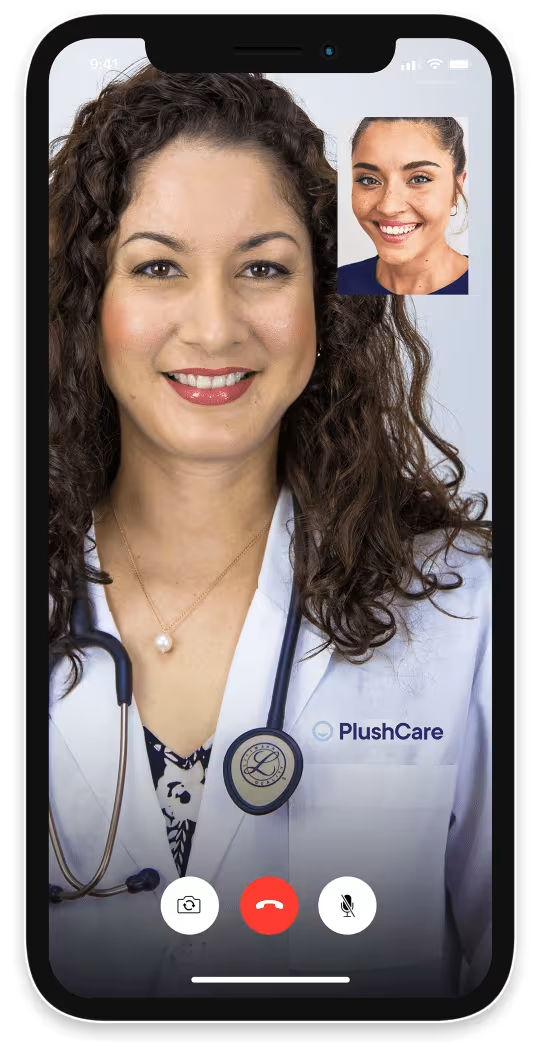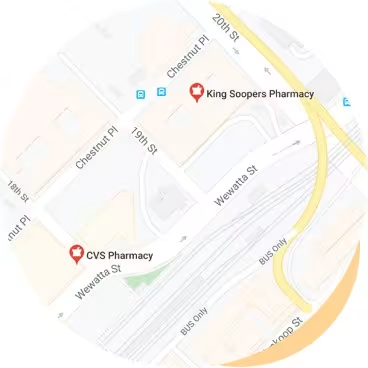- Chronic Care
Heart Disease
Heart disease management available online
To treat or manage heart disease, consult with one of our board-certified primary care doctors online. Lifestyle choices and prescription medications may be an integral part of your management journey, and our doctors are here day and night to guide you toward living healthy with heart disease.*
Book an appointmentPersonalized Heart Disease Treatment plan
Effective prescriptions for Heart Disease
Early diagnosis by board-certified doctors*
*Prescriptions are provided at the doctor’s discretion. Learn more about our controlled substances policy and how to save 80% with our prescription discount card. PlushCare doctors cannot directly diagnose or treat all cases of heart disease. Sometimes, specialist care with cardiologists and in-person evaluations for diagnosis and treatment are needed. If that is the case, our doctors will help guide you towards them with referrals and resources.

Learn about heart disease
There are several heart conditions that fall under the category of heart disease. Heart disease is the highest cause of death in the United States, and the most common type is called coronary artery disease (CAD).
With CAD, there is decreased blood flow to the heart, which can cause a heart attack. Coronary artery disease is predominately caused by arterial plaque, or cholesterol, that clogs and hardens the arteries responsible for providing your heart blood. If your heart does not get enough oxygen to pump, it can lead to heart attacks.
Heart arrhythmias occur when there are complications with one’s heartbeat. It can cause the heart to beat too fast, slow, or at an irregular rhythm. A common type of arrhythmia is atrial fibrillation (Afib). Coronary artery disease and high blood pressure are two common causes of Afib.
Congenital heart defects are what some are born with. It can affect an individual when they are as young as an infant, such as swelling and shortness of breath. Less serious cases may be diagnosed at a later stage in life such as in adulthood.
Cardiomyopathy is when the diseased heart muscle negatively impacts the ability to pump blood to the rest of the body.
Heart disease causes
Heart disease is a common name for any cardiovascular disease. It is usually caused by atherosclerosis, which is a build-up of fatty cholesterol deposits in your arteries. This can restrict blood flow to your heart and lead to chest pain, shortness of breath, and other symptoms.
If you have risk factors for heart disease, such as high blood pressure, obesity, smoking, high cholesterol, or diabetes, you can take steps to lower your risk. These include eating a healthy diet, exercising regularly, and quitting smoking.
Other causes include:
Coronary artery disease
Heart valve disease
Arrhythmia
Cardiomyopathy
Myocarditis
Symptoms of heart disease
The most common symptom of heart disease is chest pain or discomfort, which can also be felt in the arms, neck, jaw, or back. Other symptoms may include:
Shortness of breath
Nausea
Lightheadedness
Sweating
Fatigue
Irregular heartbeat
These symptoms may occur when the heart is not getting enough oxygen. If you experience any of these symptoms, call 911 or go to the nearest emergency room immediately.

How to treat heart disease
If you have heart disease, your doctor will work with you to create a treatment plan. This may include lifestyle changes, such as eating a healthy diet and getting regular exercise. Lowering processed, high-carbohydrate, foods and beverages with added sugars, along with other small changes can go a long way. You may also need medication to manage your condition.
There are several types of medications that can be used to treat heart disease, and the right type depends mostly on the underlying issue, be it high cholesterol, history of heart attack, heart arrhythmia, or high blood pressure. These medications include beta-blockers, statins, ACE inhibitors, and diuretics. Your doctor will choose the best option for you based on your individual condition.
Heart disease medications
Beta-blockers
Beta blockers are used to treat high blood pressure and irregular heart rhythms. They work by blocking the effects of adrenaline, which can help to slow the heart rate and reduce blood pressure.
ACE inhibitors
ACE inhibitors are used to treat high blood pressure and heart failure. They work by preventing the body from producing angiotensin, a hormone that can narrow blood vessels and lead to high blood pressure.
Diuretics
Diuretics are used to treat heart failure and high blood pressure. They work by removing excess fluid from the body, reducing the workload on the heart, and lowering blood pressure.
Statins
Statins are used to treat high cholesterol. They work by blocking the production of cholesterol in the liver. They have also been shown to stabilize blood vessels including coronary arteries, which can reduce the chance of heart attack and stroke, while also helping to prevent someone from having a second heart attack or stroke.
Aspirin
Aspirin is used to prevent blood clots, by acting as an antiplatelet agent, which can help to reduce the risk of heart attack and stroke caused by blood clots (thromboses or emboli).
Calcium channel blockers
Calcium channel blockers are used to treat high blood pressure and arrhythmias. They work by relaxing the muscles around the arteries, which can help to lower blood pressure.
Antiplatelet medications
Antiplatelet medications are used to prevent blood clots. They work by preventing the blood cells from sticking together, which can help to reduce the risk of heart attack and stroke.

How to prevent heart disease
There are several things you can do to lower your risk of developing heart disease. These have been tested in several patient groups and include:
Eating a healthy diet: Eating a diet low in saturated and trans fats and high in fruits, vegetables, and whole grains can help reduce your risk of heart disease.
Getting regular exercise: Getting at least 30 minutes of moderate-intensity activity on most days can help lower your risk of heart disease.
Maintaining a healthy weight: Being overweight or obese can increase your risk of heart disease. Losing weight and maintaining a healthy weight can help to reduce your risk.
Quitting smoking: Smoking is one of the leading causes of heart disease. Quitting smoking can help to reduce your risk.
Managing stress: Stress can contribute to heart disease. Learning how to manage stress can help to lower your risk.
Heart disease is a serious condition that can lead to heart attack, stroke, and death. However, there are things you can do to reduce your risk. Eating a healthy diet, exercising regularly, and quitting smoking are all important steps in preventing heart disease.

When to see a doctor for heart disease
If you have any of the above risk factors for heart disease, or if you experience any symptoms of heart disease, it is important to see a doctor. Your doctor can help diagnose your condition and develop a treatment plan. This will include testing such as an electrocardiogram (EKG) and echocardiogram (Echo), often performed and reviewed by a cardiologist. Early detection and treatment of heart disease can help to improve your chances of a successful outcome.
Heart disease treatment FAQs
What are four types of heart disease?
The four most common forms of heart disease are congenital heart disease, arrhythmia, coronary artery disease, and dilated cardiomyopathy. In addition, heart failure, myocardial infarction, hypertrophic cardiomyopathy, and mitral regurgitation are other frequent types of heart illness.
Can heart disease be cured?
While there is currently no cure for heart disease, it can be managed and improved, lowering the risk of a heart attack and stroke. Lowering your blood pressure and cholesterol are critical aspects of preventing and managing heart disease.
How long can you live with heart disease?
The ability to live with heart disease is determined by both hereditary and lifestyle factors. Many individuals successfully manage their heart problems and go on to enjoy long, healthy, and productive lives. Similarly, many people born with heart issues live long, healthy lives. Diet, exercise, disease control, and drug prescriptions are all important when living a long life.
What is the best exercise for heart disease?
Cardiovascular exercise, also known as aerobic exercise, is considered beneficial to the heart. Therefore, cardio and aerobic activities are often recommended for maintaining a healthy heart. For example, jogging, cycling, swimming, and even fast walking may help you get your blood flowing and keep your heart healthy by exercising at least three times each week. During this exercise, you should be able to speak a few words at a time but not easily say full sentences. This is a good indicator of the level to which your body is working in a way that is beneficial to your heart and overall health.
What foods cause heart disease?
High-saturated-fat, high-sugar foods such as candy, pastries, and sodas are all detrimental to a person's heart. Likewise, fast food and deep-fried dishes rich in saturated fat are also harmful.
Can heart disease be managed online?
Oftentimes, a referral for in-person evaluation with a cardiologist to perform testing necessary for diagnosis, including imaging of your heart, may be necessary. Following a heart disease diagnosis, you may be advised to take heart disease medicines to treat your condition and diet and exercise. These might include hypertension medications to reduce blood pressure and other drugs to manage your condition.
Our board-certified primary care doctors can prescribe you these drugs for heart disease management online. We follow all the clinical practice guidelines for heart disease and will ensure you are safely managed with a cardiologist when indicated by referring you to those providers in-person. When safely done, managing ongoing issues such as heart disease by using a telehealth platform to keep you out of the doctor's office and devote more time to what matters to you.
3 simple steps to get heart disease treatment today

Step 1
Book a heart disease management appointment.
Book a same-day appointment from anywhere.

Step 2
Talk to your doctor about heart disease symptoms.
Visit with a doctor on your smartphone or computer.

Step 3
Pick up medication for heart disease management, if provided.
We can send prescriptions to any local pharmacy.
Related Conditions To Heart Disease
Heart attack
A heart attack occurs when the blood supply to the heart is blocked. This can happen if the arteries become blocked by plaque. Symptoms of a heart attack include chest pain or pressure, shortness of breath, and sweating.
Heart disease is a condition that can lead to several other serious health problems. These include:
Hypertension
Hypertension, or high blood pressure, is a condition in which the force of the blood against the walls of the arteries is too high. High blood pressure can damage the arteries and lead to heart disease.
High cholesterol
High cholesterol is a condition in which there is too much cholesterol in the blood. Cholesterol is a type of fat that can build up in the arteries and lead to heart disease.
Heart failure
Heart failure is when the heart cannot pump enough blood to meet the body's needs. Many heart failure patients have later had heart disease.
Arrhythmias
Arrhythmias are conditions in which the heart beats too fast, too slowly, or irregularly. Arrhythmias can lead to heart disease.
Stroke
A stroke occurs when the blood supply to the brain is cut off. Strokes can be caused by blockages in the arteries or by bleeding in the brain. Strokes can lead to heart disease.
Peripheral artery disease
Peripheral artery disease is a condition in which the arteries that supply blood to the legs and feet become narrowed or blocked. This can lead to heart disease.
Atherosclerosis
Atherosclerosis is a condition in which the arteries become hardened and narrowed due to plaque buildup. Atherosclerosis can lead to heart disease.
Heart disease treatment pricing details
How pricing works
To request heart disease treatment and get a new prescription or refill on your prescription, join our monthly membership and get discounted visits.
Paying with insurance
Membership
$16.99/month
First month free
Visits
Copay
30 days of free membership
Same-day appointments 7 days a week
Unlimited messages with your Care Team
Prescription discount card to save up to 80%
Exclusive discounts on lab tests
Free memberships for your family
Cancel anytime
Visit price with insurance
Often the same as an office visit. Most patients with in-network insurance pay $30 or less!
We accept these insurance plans and many more:
Paying without insurance
Membership
$16.99/month
First month free
Visits
$129
30 days of free membership
Same-day appointments 7 days a week
Unlimited messages with your Care Team
Prescription discount card to save up to 80%
Exclusive discounts on lab tests
Free memberships for your family
Cancel anytime
Visit price without insurance
Initial visits are $129.
If we're unable to treat you, we'll provide a full refund.
Heart disease treatment resources
Sources:
PlushCare is dedicated to providing you with accurate and trustworthy health information.
Mayo Clinic: "Heart Disease - Diagnosis and Treatment." Mayo Clinic. Accessed on December 5, 2023, at https://www.mayoclinic.org/diseases-conditions/heart-disease/diagnosis-treatment/drc-20353124.
NHLBI (National Heart, Lung, and Blood Institute): "Treatment for Coronary Heart Disease." NHLBI. Accessed on December 5, 2023, at https://www.nhlbi.nih.gov/health/coronary-heart-disease/treatment.
WHO (World Health Organization): "Management of Cardiovascular Disease." WHO. Accessed on December 5, 2023, at https://www.who.int/southeastasia/activities/management-of-cardiovascular-disease.
Cleveland Clinic: "Cardiovascular Disease." Cleveland Clinic. Accessed on December 5, 2023, at https://my.clevelandclinic.org/health/diseases/21493-cardiovascular-disease.
PlushCare content is reviewed by MDs, PhDs, NPs, nutritionists, and other healthcare professionals. Learn more about our editorial standards and meet the medical team. The PlushCare site or any linked materials are not intended and should not be construed as medical advice, nor is the information a substitute for professional medical expertise or treatment.